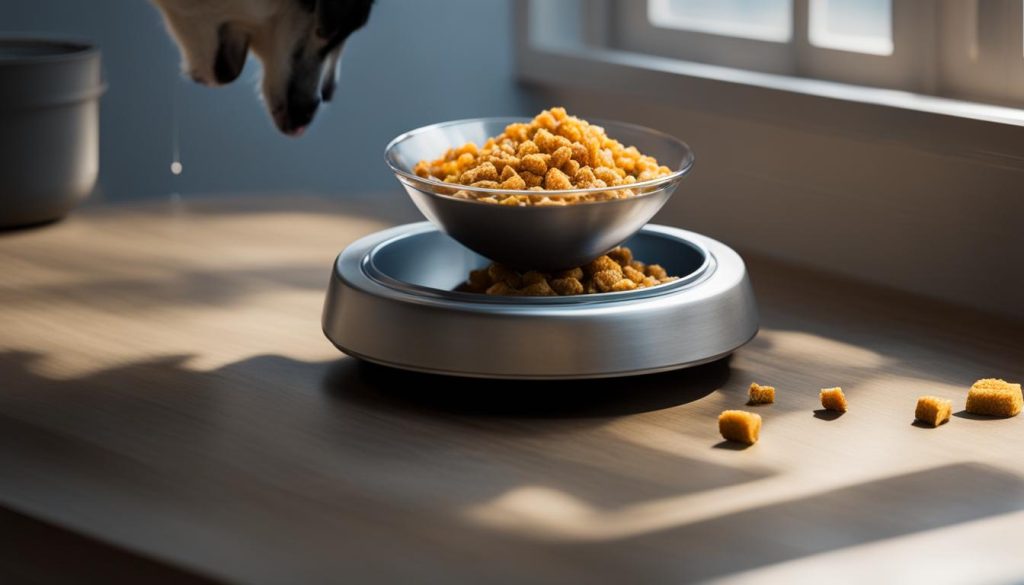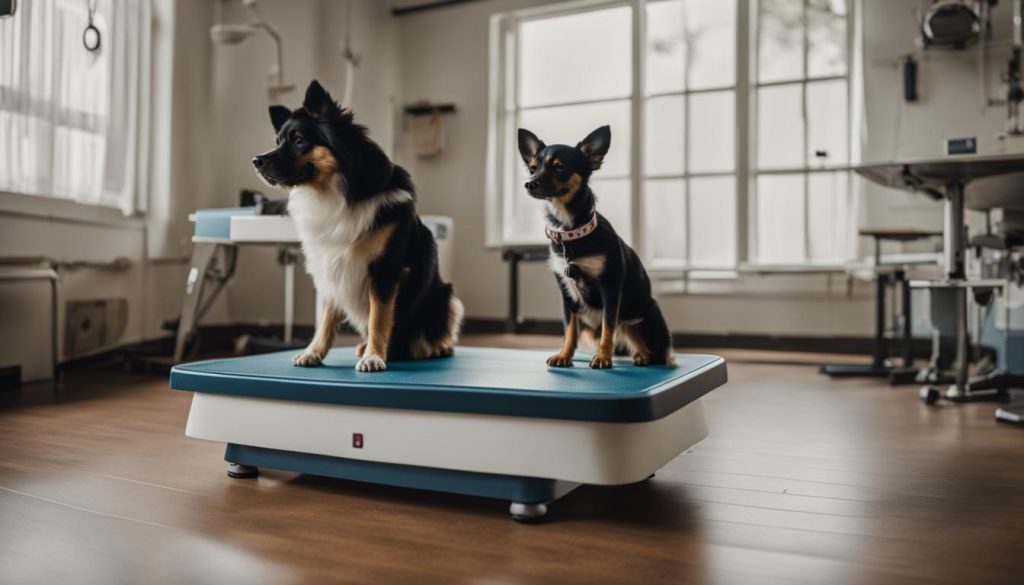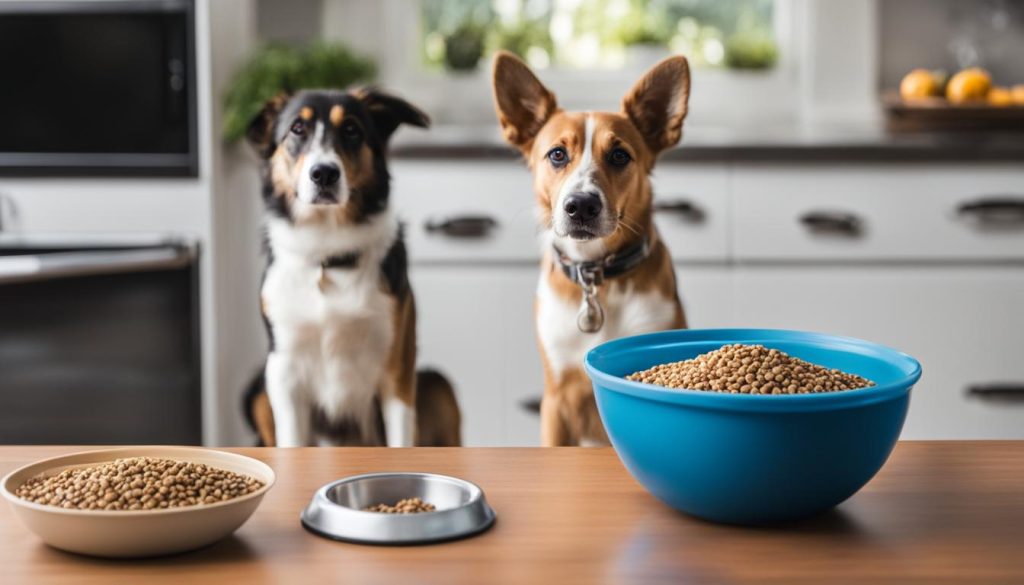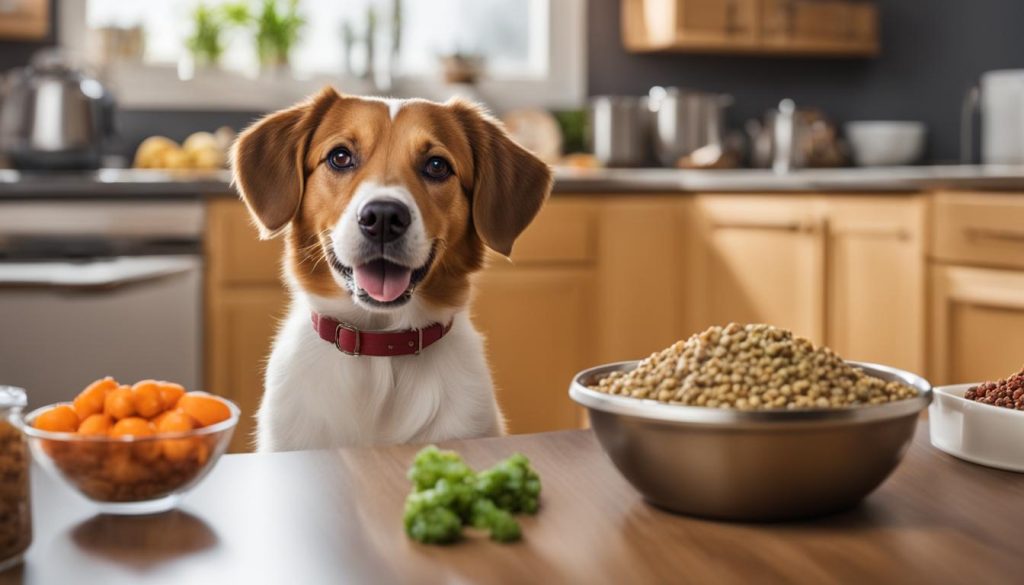Dogs may need to gain weight for various reasons, such as recovery from illness or injury, being a former stray, or simply having a lack of appetite. To help your dog gain weight in a healthy manner, it’s important to provide them with the right nutrition and care. This expert guide will provide you with tips and advice on how to help your underweight dog reach a healthy weight.
Key Takeaways:
- Feeding strategies and dietary changes can help dogs gain weight in a healthy manner
- Consulting a veterinarian is crucial for assessing your dog’s overall health and recommending personalized advice
- Choosing the right dog food that is high in nutrients and calories can aid in weight gain
- Implementing feeding techniques such as smaller, more frequent meals can increase calorie intake
- Regular monitoring and adjusting of your dog’s weight gain progress is essential
How to Determine if Your Dog is Underweight

Ensuring that your dog maintains a healthy weight is essential for their overall well-being. However, it can sometimes be challenging to determine if your dog is underweight. By carefully observing various indicators, you can assess whether your dog may be in need of weight gain. Here are some key signs to look out for:
- Visible bones: Take a close look at your dog’s ribs, spine, and pelvic bones. If these bones are easily visible without any fat covering them, it may indicate that your dog is underweight.
- Low energy levels: If your dog appears lethargic, lacks enthusiasm during playtime, or seems generally less active, it could be a sign of being underweight.
- Dull coat: A lackluster or dry coat can also be an indication that your dog is not in optimal health.
If you notice any of these symptoms, it’s best to consult with your veterinarian to confirm if your dog is underweight and to address any potential underlying medical causes.
| Signs of Underweight | What to Look For |
|---|---|
| Visible bones | Ribs, spine, and pelvic bones easily visible without fat covering |
| Low energy levels | Lack of enthusiasm, lethargy, reduced activity |
| Dull coat | Lackluster or dry appearance |
Why It’s Important to Determine if Your Dog is Underweight
Identifying if your dog is underweight is crucial for their overall health and well-being. Dogs that are underweight may be more susceptible to illnesses, have reduced muscle mass, and weakened immune systems. By recognizing the signs of underweight, you can take the necessary steps to address the issue and help your dog reach a healthy weight.
Please be aware that every dog is unique, and what may be considered a healthy weight for one breed or individual dog may differ from another. Consulting with your veterinarian is essential to determine the ideal weight for your specific dog and to develop a tailored plan to help them gain weight in a safe and healthy manner.
“A healthy weight ensures that dogs have the necessary energy, strength, and protection against illness.”
Veterinary Advice for Dog Weight Gain: Why Consulting a Vet is Essential

When it comes to helping your underweight dog gain weight, consulting a veterinarian is an essential step. Veterinarians are trained professionals who can assess your dog’s overall health, determine any underlying medical causes for weight loss, and provide personalized advice on how to safely and effectively help your dog gain weight. Here are some key reasons why veterinary advice is crucial in the journey towards a healthier and happier pup.
1. Accurate Assessment:
Veterinarians have the expertise to accurately assess your dog’s weight and body condition. They can evaluate your dog’s muscle mass, body fat, and overall health to determine the ideal weight range for your specific dog breed and age. By consulting a vet, you can ensure that your dog’s weight gain journey is on track and tailored to their specific needs.
2. Identifying Underlying Health Issues:
Weight loss in dogs can be caused by various underlying medical conditions such as gastrointestinal disorders, thyroid problems, or hormonal imbalances. These conditions may not always be obvious, but a veterinarian can conduct the necessary tests and examinations to identify any underlying health issues that may be contributing to your dog’s weight loss. Addressing these issues will not only aid in weight gain but also improve your dog’s overall well-being.
3. Tailored Weight Gain Plan:
Every dog is unique, and what works for one dog may not work for another. A veterinarian can create a personalized weight gain plan for your dog based on their specific needs. They can recommend the right type and amount of food to provide the necessary calories and nutrients for weight gain. Additionally, they can guide you on the appropriate feeding schedule and monitor your dog’s progress to make any necessary adjustments along the way.
Consulting a veterinarian is essential when helping an underweight dog gain weight. Their expertise and guidance will ensure that your dog’s weight gain journey is safe, effective, and tailored to their individual needs. Remember, your vet is your partner in helping your dog achieve a healthier weight and better overall health.
Choosing the Right Dog Food for Weight Gain
When it comes to helping your underweight dog gain weight, choosing the right dog food is crucial. You need a dog food that is not only nutritionally balanced, but also high in calories to support healthy weight gain. Look for dog food formulas that are specifically designed for weight gain or are labeled as high-calorie options.
When selecting a dog food for weight gain, opt for formulas that are complete and balanced for your dog’s specific life stage and consider their energy needs. It’s important to choose a dog food that is nutritionally balanced to ensure your dog receives all the essential nutrients they need while promoting weight gain.
High-quality dog food formulas for weight gain should also have a higher calorie content than regular dog food. Look for formulas that have increased levels of key nutrients, calories, and protein. These nutrients are essential for helping your dog build muscle mass and improve their overall body condition.
| Dog Food Brand | Calories (per cup) | Protein Content |
|---|---|---|
| Brand A | 500 | 25% |
| Brand B | 550 | 28% |
| Brand C | 600 | 30% |
Remember, it’s always a good idea to consult with your veterinarian before making any significant changes to your dog’s diet. They can provide personalized recommendations on the best dog food brands and formulas for weight gain based on your dog’s specific needs and health condition. Your veterinarian is a valuable resource and can guide you in making informed decisions to help your dog reach a healthy weight.
Feeding strategies for weight gain
When it comes to helping your underweight dog gain weight, implementing effective feeding strategies is crucial. By focusing on increasing their calorie intake and appetite, you can support their weight gain journey. Here are some feeding guidelines and tips to consider:
1. Offer smaller, more frequent meals
Instead of feeding your dog two large meals, consider offering smaller, more frequent meals throughout the day. This can help increase their overall calorie intake and encourage a healthy appetite. Splitting the meals into smaller portions also makes it easier for your dog to digest the food and absorb the necessary nutrients.
2. Add wet dog food as a topper
If your dog is a picky eater or lacks interest in their current food, try adding a small amount of wet dog food as a topper. The added moisture and different texture can make the meal more enticing for your dog. It can also provide additional calories and nutrients to support their weight gain journey.
3. Switch to a different dog food formula
If your dog is not showing interest in their current dog food, consider switching to a different formula that they find more appealing. Look for high-calorie dog food options that are specifically formulated for weight gain. Consult with your veterinarian to ensure that the new formula meets your dog’s nutritional needs.
Remember, it’s important to follow your veterinarian’s feeding guidelines and monitor your dog’s weight gain progress closely. Every dog is unique, and what works for one may not work for another. By finding the right feeding strategies that suit your dog’s preferences and needs, you can help them achieve a healthy weight.
Table: High-Calorie Foods for Weight Gain in Dogs
| Food | Calories per Serving |
|---|---|
| Roasted chicken (skinless) | 163 calories |
| Plain boiled eggs | 70 calories |
| Plain sardines (in water) | 70 calories |
| Peanut butter (unsalted, no xylitol) | 190 calories |
| Pumpkin puree (unsweetened) | 83 calories |
“Feeding strategies play a significant role in helping underweight dogs gain weight. By offering smaller, more frequent meals, adding wet food as a topper, or switching to a different dog food formula, you can support their weight gain journey.”
Remember to consult with your veterinarian before making any changes to your dog’s diet. They can provide personalized advice and recommendations based on your dog’s specific needs. By combining the right feeding strategies with a balanced and nutritious diet, you can help your underweight dog reach a healthy weight and improve their overall well-being.
Determining the right amount of food for weight gain

When it comes to helping your underweight dog gain weight, determining the right amount of food is crucial. The calorie intake for dog weight gain will depend on factors such as breed, current weight, and overall health. Consulting with your veterinarian is essential to get personalized guidance on the ideal calorie intake for your dog.
During the weight gain process, your veterinarian may recommend feeding more than the recommended amount on the dog food package. This is to ensure that your dog is getting enough calories to support healthy weight gain. As your dog progresses and achieves their ideal weight, your vet may advise scaling back on the calories to maintain their new healthy weight.
Regular monitoring of your dog’s weight is important to assess their progress and make necessary adjustments to their feeding plan. Your veterinarian may request regular weigh-ins and body condition assessments to determine if the current feeding plan is effective or if adjustments are needed.
| Dog Breed | Current Weight | Ideal Weight | Recommended Caloric Intake |
|---|---|---|---|
| Labrador Retriever | 50 lbs | 65 lbs | 1,300-1,500 calories/day |
| Chihuahua | 3 lbs | 4 lbs | 200-250 calories/day |
| German Shepherd | 75 lbs | 85 lbs | 1,700-1,900 calories/day |
Remember, these are just general guidelines and individual dogs may have different calorie requirements. It’s essential to work with your veterinarian to determine the appropriate calorie intake for your dog’s specific needs and make adjustments as necessary.
Quote
“Determining the right amount of food for weight gain is a crucial step in helping underweight dogs reach a healthy weight. Consulting with your veterinarian and monitoring your dog’s progress are key to ensuring their nutritional needs are met.”
Tips for Picky Eaters: How to Increase Your Dog’s Appetite

If your dog is a picky eater and refuses to eat enough to gain weight, there are several strategies you can try to increase their appetite. Here are some tips to help entice your dog to eat:
- Introduce different flavors: Gradually introduce different types of food to see what your dog prefers. You can try adding wet food to their dry kibble or experiment with different flavors and textures.
- Feed smaller, frequent meals: Instead of two large meals, try offering smaller, more frequent meals throughout the day. This can help increase your dog’s calorie intake and make mealtime more appealing.
- Use food toppers: Adding a tasty food topper, such as a sprinkle of shredded cheese or a dollop of plain yogurt, can make their meal more enticing.
- Try different feeding methods: If your dog isn’t interested in their regular bowls, try feeding them from puzzle toys or interactive feeders. This can make mealtime more engaging and stimulating.
Remember to be patient and consistent with these strategies. It may take some time for your dog to adjust to new foods or feeding methods. If you’re still having trouble getting your dog to eat, consult with your veterinarian about potential appetite stimulants or alternative feeding options.
Expert Advice
“Dogs can be picky eaters for various reasons, including previous negative associations with food or simply having a preference for certain flavors. It’s important to gradually introduce new foods and flavors to find what your dog enjoys. Offering smaller, frequent meals and using food toppers can help entice them to eat. If necessary, your veterinarian can recommend appetite stimulants or alternative feeding methods to support healthy weight gain.” – Dr. Emily Thompson, DVM
By implementing these tips and seeking professional advice when needed, you can help your picky eater dog develop a healthier appetite and reach their ideal weight.
Addressing potential medical causes for weight loss

When a dog is experiencing weight loss despite efforts to increase their calorie intake, it is crucial to address any potential underlying health issues that may be the cause. There are several medical reasons why dogs may lose weight, including:
- 1. Inflammatory bowel disease: This condition can interfere with the dog’s ability to properly absorb nutrients from their food, leading to weight loss.
- 2. Kidney disease: Dogs with kidney disease may have a decreased appetite and increased urination, which can contribute to weight loss.
- 3. Dental issues: Painful teeth or gum problems can make it difficult for dogs to eat, resulting in weight loss.
In order to address these potential medical causes, it is important to consult with a veterinarian. They can conduct the necessary tests to determine the underlying health condition and recommend appropriate treatment options. Treatment may include medication, dietary changes, or dental procedures, depending on the specific diagnosis.
Addressing potential medical causes for weight loss in dogs is crucial, as it allows for the proper diagnosis and treatment of any underlying health conditions. By working closely with a veterinarian, owners can ensure that their dogs receive the necessary care and support to regain a healthy weight.
It is important to note that weight loss can be a symptom of various medical conditions, and addressing the underlying health issues is essential for the overall well-being of the dog. Failure to address these potential medical causes can lead to further complications and a decline in the dog’s health. Therefore, seeking veterinary advice and treatment is crucial for helping the dog regain a healthy weight and ensuring their long-term health and happiness.
Table: Common medical causes for weight loss in dogs
| Medical Condition | Symptoms |
|---|---|
| Inflammatory Bowel Disease | Chronic diarrhea, vomiting, decreased appetite |
| Kidney Disease | Increased urination, excessive thirst, decreased appetite |
| Dental Issues | Difficulty chewing, bad breath, drooling |
Additional Weight Gain Strategies

When it comes to helping your underweight dog gain weight, there are additional strategies that you can consider. These include incorporating homemade dog food recipes and using supplements specifically designed to promote weight gain. However, it’s important to remember that these strategies should be implemented under the guidance of your veterinarian.
Making Homemade Dog Food
Making homemade dog food can be a great way to provide your dog with nutritious and calorie-dense meals. When creating homemade recipes for weight gain, include ingredients that are high in healthy fats and protein. Some examples include roasted chicken, lean ground beef, sweet potatoes, and pumpkin. However, it’s important to ensure that the homemade meals are nutritionally balanced and meet your dog’s specific dietary needs.
Using Supplements
Supplements can also be beneficial in promoting weight gain in dogs. There are specific supplements available that are formulated to provide additional calories and nutrients. These supplements often contain ingredients such as omega-3 fatty acids, vitamins, and minerals. It’s important to choose supplements that are specifically designed for weight gain and to follow the recommended dosage instructions provided by the manufacturer.
Remember, before implementing any additional weight gain strategies, consult with your veterinarian to ensure that they are appropriate for your dog’s specific needs and health condition. Your vet can provide personalized guidance and help you determine the best approach to help your dog reach a healthy weight.
Regular Monitoring and Adjusting
Once you’ve implemented weight gain strategies for your dog, it’s important to regularly monitor their progress and make adjustments as needed. Monitoring your dog’s weight gain will help you ensure that they are steadily reaching their target weight. Additionally, it will enable you to identify any potential issues early on and address them promptly.
To monitor your dog’s weight, schedule regular weigh-ins at home or at your veterinarian’s office. Keep a record of their weight over time, noting any fluctuations or changes. Pay attention to their body condition as well, assessing if they have gained the desired amount of muscle and fat.
Adjusting your dog’s feeding plan may be necessary as you monitor their progress. If your dog is not gaining weight as expected, you may need to increase their calorie intake. Consult with your veterinarian to determine the appropriate adjustments for your dog’s specific needs. They can provide guidance on how to increase the portion size or adjust the frequency of meals based on your dog’s response to the current feeding plan.
Remember that each dog is unique, and what works for one may not work for another. It’s essential to closely observe your dog’s body condition and weight gain to tailor their feeding plan accordingly. With regular monitoring and adjustments, you can ensure that your dog is on track to reach and maintain a healthy weight.
Importance of a balanced diet
When it comes to helping your underweight dog gain weight, providing them with a balanced diet is of utmost importance. While it’s crucial to provide additional calories for weight gain, it’s equally essential to ensure that your dog’s diet remains complete and nutritionally balanced. Over-relying on treats or unhealthy high-fat foods can lead to nutrient imbalances and potential health issues. Maintaining a balanced diet for your dog will support their overall well-being and promote healthy weight gain.
Consulting with your veterinarian is vital in ensuring that your dog’s diet meets their specific nutritional needs. They can provide advice on the right balance of nutrients, calories, and serving sizes for your dog’s breed, age, and overall health. Your veterinarian can guide you in selecting the appropriate dog food formulas that are complete and balanced, taking into account your dog’s unique requirements for weight gain.
Incorporating a variety of nutrient-rich foods into your dog’s diet can also contribute to a balanced approach. Consult with your veterinarian about incorporating healthy options such as roasted chicken, boiled eggs, or plain sardines. However, it’s crucial to avoid foods that can be toxic to dogs, such as chocolate, onions, or grapes. Your veterinarian can provide guidance on safe and beneficial additions to your dog’s meals.
Key Points:
- A balanced diet is essential for healthy weight gain in underweight dogs.
- Over-reliance on treats or unhealthy high-fat foods should be avoided to prevent nutrient imbalances and potential health issues.
- Consult with your veterinarian to ensure your dog’s diet meets their specific nutritional needs.
- Incorporate a variety of nutrient-rich foods with guidance from your veterinarian.
- Avoid foods that are toxic to dogs and can compromise their health.
| Nutrient | Role | Food Sources |
|---|---|---|
| Protein | Building blocks for muscle growth and repair | Lean meats, poultry, fish, eggs |
| Carbohydrates | Provide energy | Whole grains, vegetables, fruits |
| Fats | Source of concentrated calories | Salmon oil, flaxseed oil, chicken fat |
| Vitamins and Minerals | Support overall health and proper body function | Fruits, vegetables, organ meats |
Wrapping Up
To summarize, this expert guide has provided valuable tips and advice on how to help your underweight dog reach a healthy weight. By following the proper nutrition guidelines, consulting with your veterinarian, and implementing feeding strategies, you can effectively support your dog’s weight gain journey.
Remember that choosing the right dog food is key. Look for high-calorie, nutritionally balanced formulas recommended by your vet. Feeding smaller, more frequent meals and introducing wet food as a topper can help increase your dog’s calorie intake and appetite.
Regular monitoring of your dog’s weight, adjusting their feeding plan as needed, and addressing any potential underlying health issues are essential for their overall well-being. By maintaining a balanced diet and seeking veterinary guidance throughout the process, you can ensure your dog achieves and maintains a healthy weight.
FAQ
How can I tell if my dog is underweight?
You can assess their bones’ visibility, energy levels, and coat condition. Consult with your veterinarian for confirmation.
Should I consult a veterinarian before implementing weight gain strategies?
Yes, it is crucial to assess your dog’s overall health and rule out any underlying medical conditions.
What should I look for in the best dog food for weight gain?
Look for complete and balanced formulas with high levels of nutrients, calories, protein, and high digestibility.
Are there feeding strategies I can use to help my dog gain weight?
Yes, you can offer smaller, more frequent meals and consider adding wet food as a topper or switching to a more appealing formula.
How do I determine the right amount of food for weight gain?
Consult with your veterinarian to determine the ideal calorie intake based on your dog’s breed, weight, and overall health.
What should I do if my dog is a picky eater?
Try gradually introducing different types of food, consult with your veterinarian about appetite stimulants or alternative feeding methods.
What if my dog continues to lose weight despite efforts to increase their calorie intake?
Consult with your veterinarian to address potential underlying health issues and determine appropriate treatment.
Are there additional weight gain strategies recommended by veterinarians?
Yes, veterinarians may recommend adding healthy human foods or specific supplements. Always follow their guidance.
How often should I monitor my dog’s weight and adjust their feeding plan?
Regularly monitor your dog’s weight and consult with your veterinarian for guidance on adjusting the feeding plan as needed.
Is it important to maintain a balanced diet for my dog during weight gain?
Yes, avoid relying on treats or unhealthy high-fat foods and consult with your veterinarian to ensure a balanced diet.
How can I ensure my dog reaches a healthy weight?
By following proper nutrition, feeding strategies, and veterinary guidance, you can effectively help your dog reach a healthy weight.






